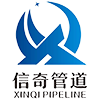GOST 33259 is a standard developed by the Russian National Standard Technical Committee (Russian National Standard) for the specification of steel flanges. This standard is widely used in Russia and some former Soviet countries and some other regions.
Flange type:
The standard includes different types of steel flanges, such as Welding Neck Flange, Blind Flange, Slip-On Flange, Threaded Flange, etc. . Each type of flange has different connection methods and applicable scenarios.
Size range:
GOST 33259 specifies the range of flange diameters in different sizes ranging from 15mm to 2000mm. This means that the standard is suitable for connections and applications in a wide variety of pipe diameters.
Pressure Level:
The GOST 33259 standard covers steel flanges of different pressure classes, usually including PN6, PN10, PN16, PN25, PN40 and so on. Each pressure level corresponds to different pressure and temperature requirements to meet the needs of different engineering applications.
Scope of application:
GOST 33259 standard applies to steel flanges for connecting pipes and pipe fittings. These flanges are mainly used in various liquid and gas conveying systems in the industrial and construction fields.
Material requirements:
The standard specifies the material requirements for steel flanges in detail, including the type of steel used, chemical composition, mechanical properties, and heat treatment requirements. These requirements are intended to ensure the quality and reliability of flanges.
GOST 33259 standard, as an industry standard in the Russian region, is of great significance for pipeline engineering and related applications in this region. However, with the trend of globalization and the use of international standards, some international standards (such as ANSI/ASME, ISO, EN, etc.) are widely used worldwide. When it comes to international collaborations or international projects, additional criteria may need to be considered to ensure that different regional and national requirements are met.
GOST 33259, as a steel flange standard formulated by the Russian State Technical Committee for Standardization, has some advantages and some disadvantages.
Advantage:
1. Regional applicability: GOST 33259 is a national standard in the Russian region, so it has wide applicability and acceptance in this region. The GOST 33259 standard is widely used in engineering projects in Russia as well as in some former Soviet countries and some other regions, helping to ensure a certain degree of standardization and consistency.
2. Domestic market support: In Russia, the GOST 33259 standard is supported and regulated by the government. Products that meet this standard can usually more easily meet relevant regulations and requirements, making local production and procurement more convenient.
3. Focus on local needs: The GOST 33259 standard is formulated according to the actual needs and engineering projects in the Russian region, so it is more likely to better adapt to the local engineering requirements and environment.
Disadvantanges:
1. Geographical limitations: GOST 33259 is a Russian national standard, so its international applicability is limited. When it comes to transnational cooperation or international projects, it may be necessary to consider other internationally accepted standards, such as ANSI/ASME, ISO, EN, etc.
2. Update lag: Since the standard formulation and update process may be relatively slow, the GOST 33259 standard may lag behind international standards in terms of some technical and engineering requirements. Some new materials, technologies, and best practices may not have been incorporated into the standard in a timely manner.
3. Limiting the selection range: GOST 33259 standard may be relatively limited in terms of flange type, material requirements and size range, and may not be able to meet certain special engineering projects or specific requirements.
On the whole, the GOST 33259 standard has important application value in the Russian region and helps to promote pipeline engineering in the fields of local water supply, gas supply, industry and construction. However, in international cooperation or transnational projects, the limitations of this standard need to be weighed, and products and specifications that meet international general standards may be selected to meet broader engineering needs and standard requirements.
Post time: Aug-03-2023




